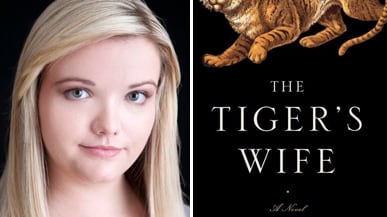When The New Yorker released its list of 20 notable writers under the age of 40 last year, many of the names were no surprise (Jonathan Safran Foer, Wells Tower). Then there was the wild card. At 25, Tea Obreht was the youngest writer on the list, and also the most obscure. All that is about to change. Her novel, The Tiger's Wife, has just been published, and suffice to say it is one of the most anticipated debuts of the year. Set in an unnamed Balkan country, it tells the interwoven stories of a zoo tiger who escapes and stalks a mountain village; a doctor who keeps meeting a man who claims to be immortal; and the doctor's granddaughter, who pieces together the story of the tiger and the deathless man in an attempt to understand her grandfather's life and her country's war-torn history.

Last year you were named to the New Yorker's "20 Under 40" list, you also had a story included in the Best American Short Stories, and your debut novel, The Tiger's Wife, is getting a lot of advance praise. How are you handling all this?
It really has been overwhelming in the most wonderful possible way. The pressure that I feel is so positive that I'm trying not to look at it as pressure. When I first wrote the book and it was sold in 2008, my reaction was, I can't believe somebody read the book and wants to put it on the shelf. Now I look at the box of my books and I still can't believe it.
You are 26. Have you talked to anyone else who had sudden, intense attention for his or her first book at such a young age?
I talked to Karen Russell (author of Swamplandia). She reached out to me, and now we're emailing. She's very good at pinpointing the feeling of how it progresses, the ways to keep yourself grounded.
You spent the first years of your life in Belgrade, but now live in Ithaca, New York. The Tiger's Wife is set in an unnamed Balkan country. Is it easier to write about a place when you're away from it?
It's definitely easier for me. I did no writing while I was visiting the Balkans. I do no writing while I'm in Belgrade visiting my grandma. There's a way you think about your experiences and process them after the fact that makes it much more organic. When you're in a place, the details you focus on are different than details you focus on when you're writing about it. For instance, when I wrote about the tiger's escape from the zoo, I wrote about the zoo I remembered from my childhood, which has since changed. I've seen the new zoo, but I wanted to describe the zoo of my childhood.
“I’ve always written about animals. I’m still trying to process why that is.”
Can you talk about your childhood?
I left Belgrade when I was 7. My family moved because of the war. I lived with mother and her parents. My grandfather was an engineer. His job took us from place to place, so my childhood happened on the move. I grew up in Cyprus and Egypt, these fantastic places I remember fondly. In a way I was raised with newness. Going back to Belgrade after 11 years, there was a newness to it, so the experience of it was familiarly exciting. That newness and familiarity combo was unique. Then my mother and I moved to a suburb of Atlanta, where a whole slew of my family members lived, and then to Palo Alto, California. I did my undergrad at the University of Southern California and I got my MFA from Cornell.
The Tiger's Wife contains stories within stories within stories. Did you write it linearly, or write each story and then break them apart?
I didn't write it linearly at all. Very early on it became clear there were three story lines that needed to be interwoven. I wrote the parts that interested me the most first, then tried to develop the parts that were necessary but I was not as emotionally invested in later. I wrote the tiger story first—it came from a story for a workshop. The deathless man character had been creeping around in other things I had written, so he came next. Then the present day part with Natalia I wrote last, and I wound up rewriting it almost entirely after I went on a research trip to the Balkans (for a nonfiction magazine piece on vampire legends). I was there in small villages talking to people about something they weren't comfortable discussing. I was knocking on doors saying, I've heard this story about vampires, will you talk about it. It was a clear window onto small village life. It gave me a lot of insight into particulars and details of the region.
In The Tiger's Wife we read about a lot of superstitions that might, from an American perspective, seem ridiculous or bizarre. When you were writing this, did you become aware of American rituals or superstitions that seem equally bizarre?
I guess some of the traditions surrounding holidays here might seem strange. During one of our first Thanksgivings here we had people over and we served ham, which was obviously not right. We thought, what's the big deal?
The descriptions of the tiger—not just what it looks like, but what it smells and sounds like—are incredible, and are one of the things that ground the book in reality despite its fantastical elements. Did you spend time with real tigers?
I spent a lot of time at the Syracuse zoo (in New York), which has a fantastic Siberian tiger exhibit. I never was in close contact with the tiger. I watch a lot of nature documentaries, I'm sort of a nerd that way.
The book has many animal characters, including some who are imbued with human qualities, and humans who are perceived as having animal qualities. In addition to two tigers there is the elephant, the dog, the bear, an ibis. Zoos also figure prominently in the book. Can you talk about your use of animals to reveal human motivations?
Obviously a lot of cultures anthropomorphize animals in their myths and stories, but there's a real history of that in Slavic myth, so it happened naturally. I've always written about animals. I'm still trying to process why that is. I think animals can end up being symbols, but I've never begun a story using an animal as a stand-in for a theme or as a metaphor. With the tiger, for instance, I was interested in his character's journey. Whatever he came to represent to the people of the village, the origins of the tiger in the context of the narrative. Animals have a way of tapping into human emotions and strife as well.
I read that you wrote this as a way of dealing with the death of your grandfather. What was he like? The grandfather in the book is a very proper man, who shines his shoes before going to help fight a fire.
He definitely shined his shoes. He was a very polished man. In the casting of the character in the book I ended up incorporating a lot more of my grandfather than I thought I was going to. Your work runs away with itself. We were very close, we did go to the zoo, he was this very tall imposing man who everyone was afraid of. My memories of him—there are no absolute autobiographical anecdotes, but the essence of the characters is more autobiographical than I intended. It had to do with the way I was processing the loss of him.
Have you been writing all your life?
I have. I wrote a story when I was 8 and we were living in Cyprus. My mother had this laptop and I wanted to hear the keys click, so I wrote a little story on it. When I was done I went in the kitchen and said I wanted to be a writer and that was the plan from then on.
Your favorite writers include magical realists Toni Morrison and Gabriel Garcia Marquez. Your book incorporates magical realism, but is also very grounded in the concrete, here and now.
In trying to write about several generations, I wanted parts of the story to have a voice that was contemporary and to perhaps not be as fantastical. The way the fantastic ended up working in the novel is as something that is very much sharpened by war. I wanted to have a contrast to that. That's where the contemporary parts come in.
Are you working on another novel?
I am. I took a while to get attached to another project. Without going into any specifics of what I'm working on, there comes a moment in the process with every piece I've felt satisfied with where it's like a trancelike state and the world you're trying to create becomes real. If I don't reach that state it crumbles. I've learned, painfully, there's no artificial way to get there. It happens or it doesn't.
So have you reached that trancelike state with your new novel?
I'm almost there.
Plus: Check out Book Beast for more news on hot titles and authors and excerpts from the latest books.
Jennie Yabroff is a staff writer at Newsweek covering books, movies, food, and art.






